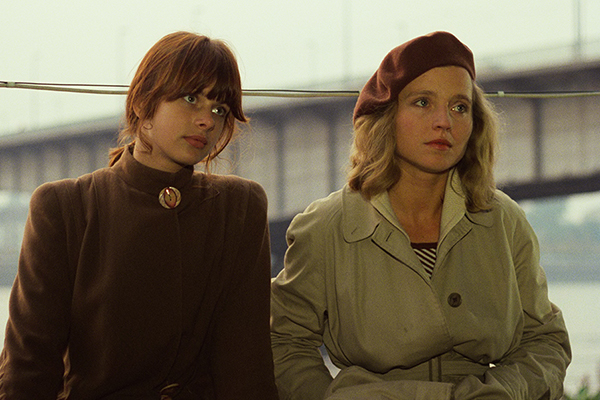Poetic female presences
in the cinema of Wim Wenders
PostED ON 20.10.2023
Wim Wenders' seminal works are stories of men who come across young women in soft apparition mode. Whether terrestrial or celestial, they are defining figures of Wenders' cinema.
Terrestrial
She is the seated woman with whom the protagonist in passing spends a moment, a woman who interests us from the waist up, since her main motivation is talking - saying blunt, melancholy things. In Alice in the Cities (1974), Lisa Kreuzer, with her very beautiful dark-circled eyes, plays Lisa van Dam, a German woman lost in New York and the mother of a little girl. She tells the leading man that she wants to sleep, but not to have sex. Forced to do so, she temporarily leaves her child behind… like Jane, the ‘runaway’ mother of Paris, Texas (1984). Jane, played by Nastassja Kinski, is also somewhat immobile, restricted to her small ‘peep show’ room, wearing a spectacular soft red-orange jumper under the bright light, while she delivers her poignant monologue.
Between land and sky
As Pauline in Kings of the Road (1976), Lisa Kreuzer plays a young woman with a strange sense of humour who suggests that the protagonist light a candle in the shape of Hitler's head. An usher in a porn cinema, she tells stories of vaginal cramps in the dark of the theatre. She is one of the few women who accompanies the Wenders character on his journey.

Nastassja Kinski and Hanna Shygulla in Wrong Move, 1975 © Wim Wenders Stiftung
Celestial
Another kind of heroine appears in Wenders' films, the graceful girls who never touch the ground. In Wrong Move (1975) Therese, played by the ironic sphynx Hanna Shygulla, smiles on a train that gives the impression of taking off! She's light, seemingly at a distance, and irresistibly attractive to the main character, who sees her as an addictive apparition… Du bist ein Engel/You are an angel, says a man to Marion in Wings of Desire (1987). This young trapeze artist played by Solveig Dommartin, with literal wings on her back, is forever spinning in the air. She is looking for love. For her, one of the stars, an actual angel, is ready to land.
With celestial women, the Wenders man hopes to be able to stop moving. The aptly named Sky, incarnated by Sarah Polley in Don't Come Knocking (2005), wants her father to finally settle down. Whether earthly or celestial, Wenders' poetic women reveal themselves honestly and ask the man facing them, like Jane: Is there anything you'd like to tell me?

Sarah Polley in Don’t come knocking, 2005 © Wim Wenders Stiftung
Virginie Apiou

